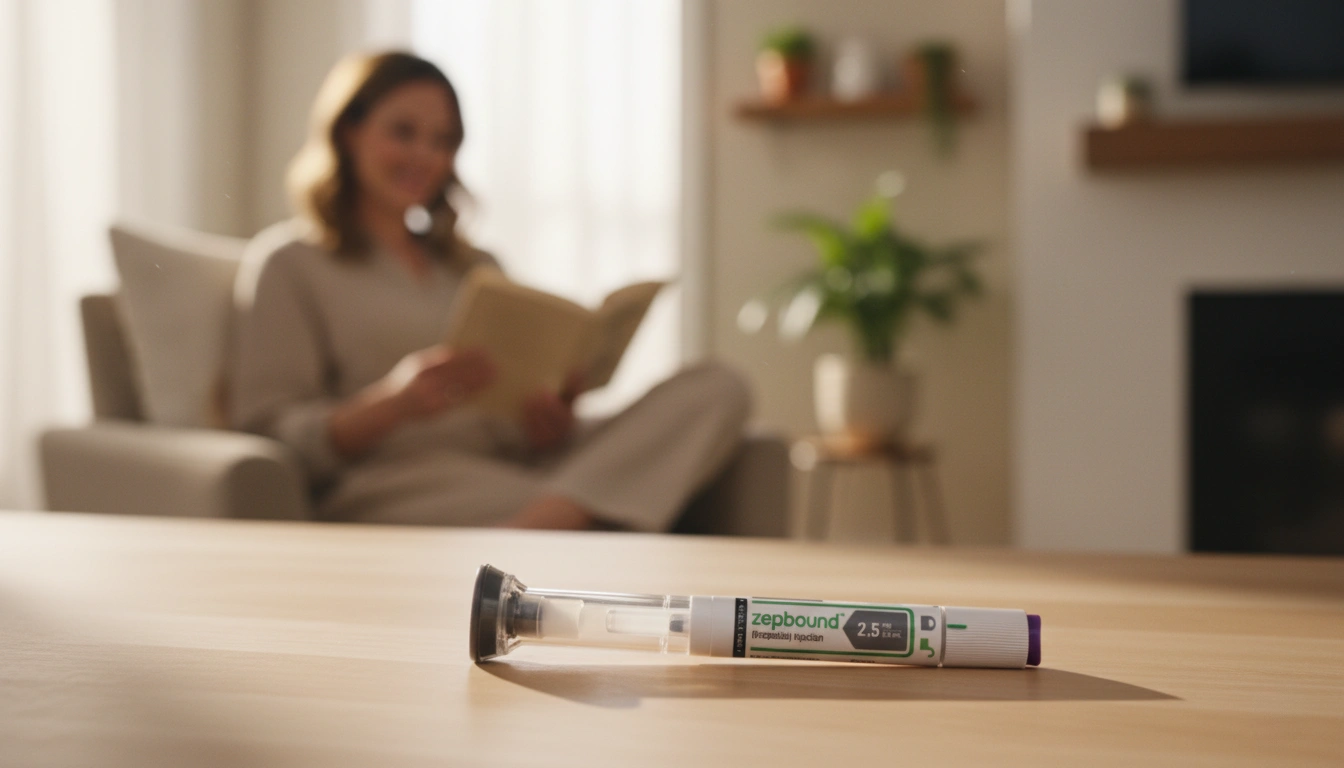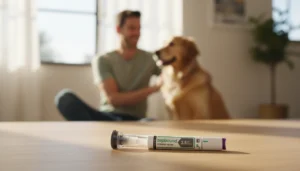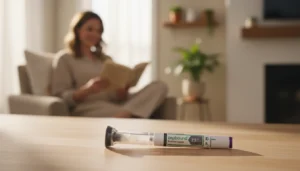Can You Take Zepbound After Eating? Understanding Timing and Best Practices

Introduction
Have you ever wondered how the timing of medication can impact its effectiveness? For those embarking on a weight loss journey with the help of Zepbound (tirzepatide), understanding the nuances of when to take this medication can be crucial. While many might focus on what to eat or how much to exercise, the timing of Zepbound injections can significantly influence your experience and results.
Zepbound is an innovative medication designed to assist with weight management, particularly for individuals struggling with obesity or excess weight related to health conditions. With its unique mechanism of action, Zepbound helps regulate appetite and promotes a feeling of fullness, making it a powerful ally in the weight loss journey.
In this blog post, we will delve into the specifics of Zepbound, particularly focusing on the question: Can you take Zepbound after eating? We will explore how this medication works, the recommended timing for injections, and the dietary considerations to keep in mind to maximize its effectiveness. Additionally, we will discuss the importance of a personalized approach to weight loss, which is at the heart of TrimRx's mission.
By the end of this post, you will have a comprehensive understanding of how to best integrate Zepbound into your weight loss plan, ensuring you get the most out of your treatment.
Understanding Zepbound: How It Works
Zepbound (tirzepatide) is a prescription medication that acts as a dual agonist for the glucose-dependent insulinotropic polypeptide (GIP) and glucagon-like peptide-1 (GLP-1) receptors. This dual action is significant because it not only helps lower blood sugar levels but also plays a crucial role in appetite regulation.
Mechanism of Action
- Appetite Regulation: Zepbound influences brain signals related to hunger and satiety, helping you feel full sooner and reducing the desire to overeat. This mechanism is particularly beneficial for individuals looking to maintain a reduced-calorie diet.
- Insulin Secretion: By enhancing insulin secretion in response to meals, Zepbound helps manage blood sugar levels more effectively. This is especially important for those who may also have type 2 diabetes, as it can lead to improved overall metabolic health.
- Gastric Emptying: This medication slows down gastric emptying, which prolongs the feeling of fullness after eating. This is a key factor in reducing the frequency of snacking and unnecessary caloric intake.
FDA Approval and Usage
Zepbound was approved by the FDA in 2023 for chronic weight management in adults with obesity or excess weight, particularly those with weight-related health issues. It is important to note that Zepbound should be used as part of a comprehensive weight loss program that includes a reduced-calorie diet and increased physical activity.
Timing and Administration of Zepbound
Recommended Injection Schedule
Zepbound is typically administered via a subcutaneous injection once a week. One of the questions we often encounter is whether it’s better to take Zepbound before or after meals.
According to the prescribing information, Zepbound can be injected at any time, regardless of meals. This flexibility is particularly advantageous for individuals with varying schedules. However, some users prefer to take it at a consistent time each week, which can help establish a routine and improve adherence to the medication.
Can You Take Zepbound After Eating?
The short answer is yes; you can take Zepbound after eating. The medication is designed to be effective regardless of the timing of food intake. However, there are several considerations to keep in mind:
- Personal Preference: Some individuals may find that taking Zepbound after a meal helps them feel more comfortable, especially if they experience any initial gastrointestinal side effects.
- Gastrointestinal Effects: As Zepbound can potentially cause nausea or digestive discomfort, injecting after eating might alleviate some of these side effects. However, it’s essential to monitor how your body responds to the timing and adjust as necessary.
- Dietary Considerations: While there are no strict food restrictions, certain foods can exacerbate side effects, especially if consumed in large quantities. For example, greasy or high-fat foods may lead to increased nausea. Therefore, if you find that taking Zepbound after a meal leads to discomfort, it may be worthwhile to reassess your dietary choices or the timing of your injection.
Dietary Considerations While Using Zepbound
Foods to Embrace
To maximize the benefits of Zepbound, adopting a balanced diet rich in whole foods is crucial. Here are some recommendations:
- Lean Proteins: Incorporating lean sources of protein, such as chicken, turkey, fish, legumes, and tofu, can help with satiety.
- Fruits and Vegetables: These are high in fiber and nutrients while being low in calories. They can help promote fullness without excessive caloric intake.
- Whole Grains: Opt for whole grains over refined grains. Foods like brown rice, quinoa, and whole-wheat bread provide more fiber, which can aid in digestion and satiety.
Foods to Avoid
While there are no outright prohibitions, certain foods may worsen side effects or hinder weight loss progress:
- High-Fat and Greasy Foods: These can exacerbate gastrointestinal side effects. It’s advisable to limit foods like fried items and heavy sauces.
- Sugary Foods: Foods high in sugar can lead to blood sugar spikes and crashes, counteracting the effectiveness of Zepbound.
- Highly Processed Foods: These often contain additives that can lead to increased cravings and overeating.
The Importance of Personalized Weight Loss
At TrimRx, we believe in the power of personalized care. Every individual’s journey is unique, and weight loss is no exception. Our approach emphasizes the integration of advanced medical science with compassionate care, ensuring that each patient receives a treatment plan tailored to their specific needs.
Taking the First Step: Our Free Assessment Quiz
To enhance your weight loss journey, we invite you to take our free assessment quiz. This quiz is designed to help us understand your unique health profile and determine your eligibility for our personalized weight loss medications, including Zepbound. By taking this step, you will be on your way to receiving a customized treatment plan that aligns with your goals.
Take our free assessment quiz here!
Conclusion
In conclusion, yes, you can take Zepbound after eating. The flexibility in timing allows you to incorporate this medication seamlessly into your lifestyle. Understanding how Zepbound works, the best practices for administration, and the dietary considerations can significantly enhance your weight loss journey.
At TrimRx, our commitment to providing personalized, medically supervised weight loss solutions ensures that you have the support and resources necessary for success. Remember, your journey is unique, and we are here to help you every step of the way.
If you’re looking for immediate support supplements to complement your weight loss efforts, consider exploring our GLP-1 Daily Support and Weight Loss Boost options.
FAQ
Can I take Zepbound at any time of day?
Yes, Zepbound can be taken at any time of day, with or without food. However, consistency in timing can help improve adherence.
What should I do if I miss a dose of Zepbound?
If you miss a dose, take it as soon as you remember within 4 days. If more than 4 days have passed, skip the missed dose and take your next dose on the regular schedule.
Are there foods I should avoid while taking Zepbound?
While there are no strict restrictions, it is advisable to limit high-fat, greasy, and sugary foods, as these may exacerbate side effects and hinder weight loss progress.
How long does it take to see results with Zepbound?
Many individuals begin to notice weight loss within a few weeks, but results can vary based on individual factors such as diet and activity level.
How can TrimRx help me on my weight loss journey?
TrimRx offers personalized weight loss solutions, including medically supervised care and support to help you achieve sustainable results tailored to your unique needs.

Transforming Lives, One Step at a Time
Keep reading
Navigating Your Path: How Many Doses Are In Zepbound and What It Means for Your Health Journey
Curious how many doses are in Zepbound? Discover its weekly dosing schedule, available strengths, and titration process for effective weight loss. Learn more!
Navigating Your Zepbound Journey: Understanding Dosing and Expert Guidance
Wondering how to split doses of Zepbound? Learn why it’s unsafe & not recommended. Get expert guidance on Zepbound dosing for safe, effective weight loss with TrimRx. Click to learn more!
Understanding Zepbound Dosing: What is the Lowest Dose Available for Your Weight Loss Journey?
Curious what is the lowest dose of Zepbound available? Learn about Zepbound’s 2.5mg starting dose, titration, and safe use for weight loss. Get expert guidance!



